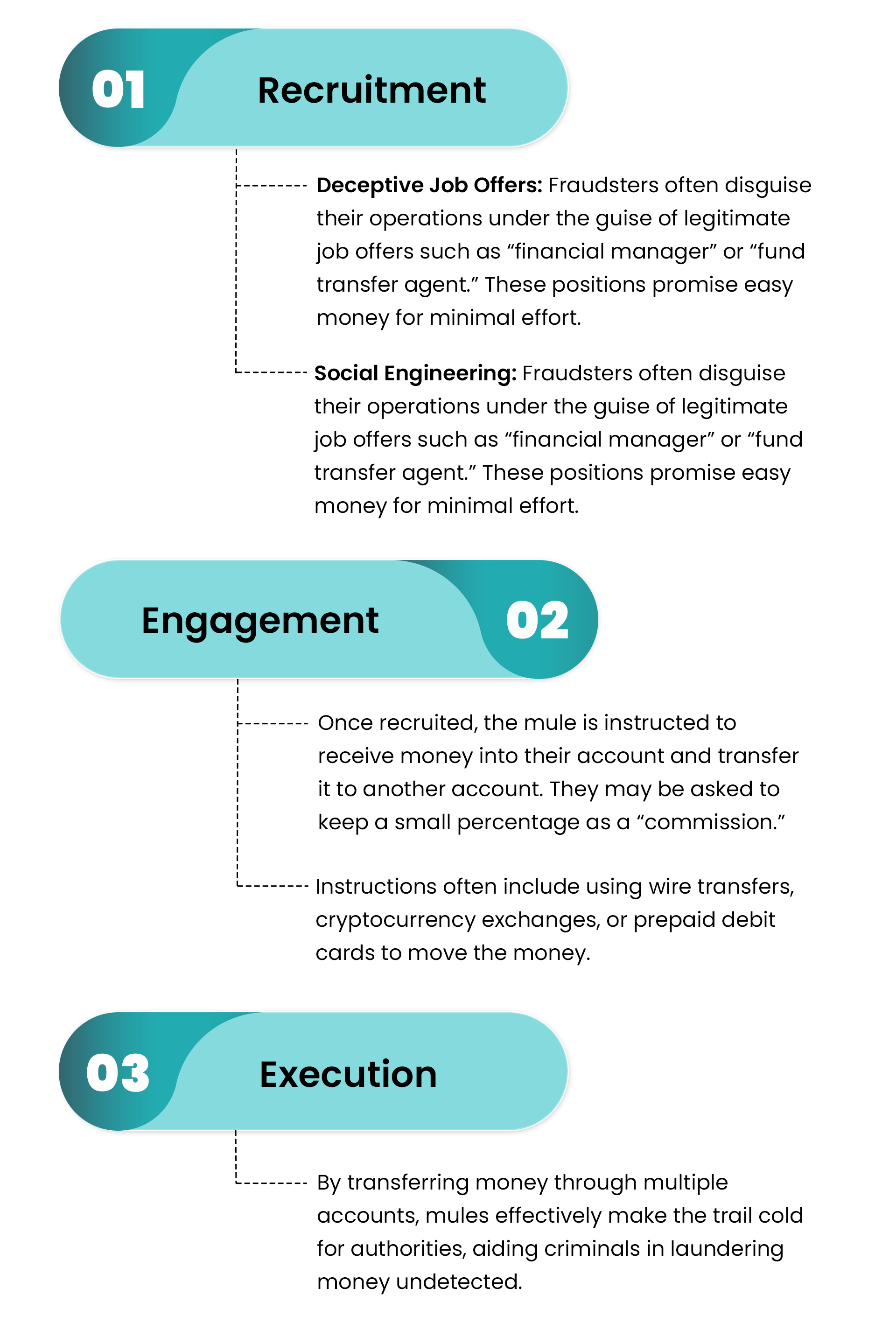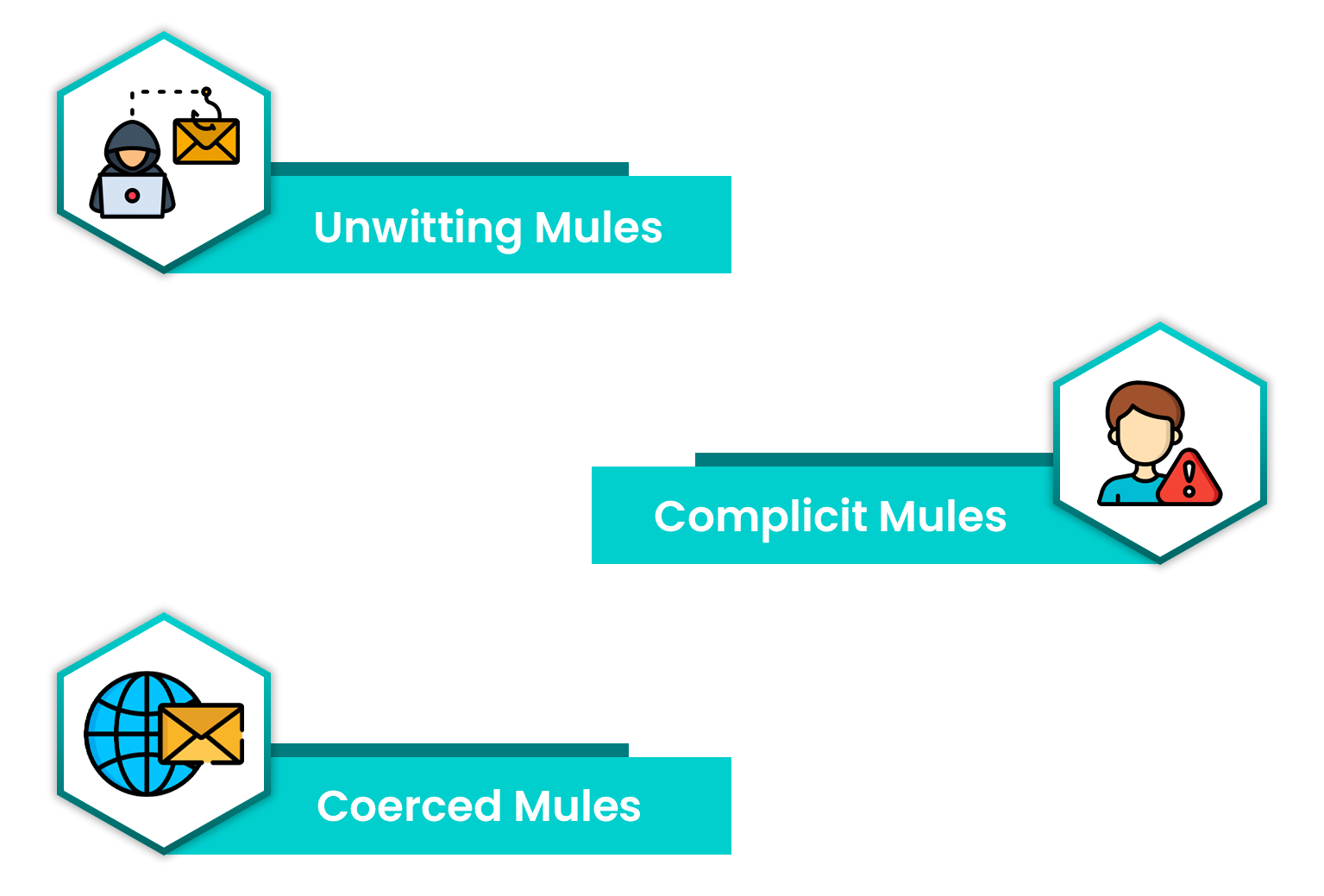In the world of financial fraud, one alarming tactic that has surfaced is the use of money mules. These individuals, knowingly or unknowingly, assist criminals in laundering money by transferring illegally obtained funds between different accounts. Understanding what money mules are, how they operate, and the impact they can have on your finances is essential in protecting your assets and contributing to a safer financial ecosystem.
What is a money mule?
A money mule is a person who transfers stolen or illegally obtained money on behalf of others. While some mules are active participants in fraud schemes, others are unsuspecting individuals who are tricked into assisting criminals.
Money mules serve as intermediaries in the money laundering process, moving funds from one account to another to obscure the origins of the money. This tactic makes it harder for law enforcement agencies to trace the funds back to the original crime.
How money mules operate
Money mule schemes typically follow a structured process. Here’s how it works:

- Recruitment:
- Deceptive job offers: Fraudsters often disguise their operations under the guise of legitimate job offers such as “financial manager” or “fund transfer agent.” These positions promise easy money for minimal effort.
- Social engineering: Criminals use social media platforms, emails, or direct messages to lure individuals. They target vulnerable populations, such as students or job seekers, who may be more inclined to take up quick money-making opportunities.
- Engagement:
- Once recruited, the mule is instructed to receive money into their account and transfer it to another account. They may be asked to keep a small percentage as a “commission.”
- Instructions often include using wire transfers, cryptocurrency exchanges, or prepaid debit cards to move the money.
- Execution:
- By transferring money through multiple accounts, mules effectively make the trail cold for authorities, aiding criminals in laundering money undetected.
Types of money mules

Money mules can be broadly categorized into three types:
- Unwitting mules: These individuals are unaware that they are participating in an illegal activity. They are often duped through fraudulent job postings or schemes promising financial assistance.
- Complicit mules: These mules are aware of their role in money laundering and willingly participate for financial gain.
- Coerced mules: Criminals may blackmail or threaten individuals into becoming mules, leaving them with little choice but to comply.
Examples of money mule scams
- Online job scams: Fraudsters post fake job ads targeting individuals who are eager for employment. Victims unknowingly use their personal bank accounts to transfer funds.
- Romance scams: Perpetrators pose as romantic partners online, convincing victims to move money under the pretext of helping with financial troubles.
- Social media scams: Scammers use platforms like Facebook or Instagram to recruit people by offering high-paying “flexible jobs.”
Legal and financial consequences for money mules
While the idea of earning quick cash might seem tempting, the repercussions of acting as a money mule can be severe.
- Legal consequences:
- Engaging in money laundering, whether knowingly or unknowingly, is a criminal offense in most jurisdictions. Penalties can include fines, imprisonment, or both.
- Even unwitting mules may face charges if they fail to prove their innocence or due diligence.
- Financial damage:
- Bank accounts of mules are often frozen or closed, leaving them without access to their funds.
- They may be held liable for the stolen money that passes through their accounts, leading to substantial financial loss.
- Reputational harm:
- Being linked to money laundering can tarnish an individual’s reputation, making it difficult to secure employment or financial services in the future.
Impact on the financial ecosystem
Money mule activities have far-reaching consequences beyond the individuals involved:
- Enabling crime: Money mules facilitate organized crime, terrorism financing, and human trafficking by helping launder money.
- Increased costs for financial institutions: Banks and other financial entities invest heavily in anti-money laundering (AML) measures to combat these schemes, which raises operational costs.
- Regulatory strain: Governments and regulatory bodies face increased pressure to monitor and regulate financial systems to prevent such activities, leading to stringent laws that affect legitimate businesses and individuals.
How to protect yourself
Awareness and vigilance are key to avoiding becoming a money mule. Here are steps you can take:
- Recognize red flags:
- Be cautious of job offers that promise high earnings for minimal effort.
- Avoid providing your bank account details to unverified individuals or entities.
- Verify job offers:
- Research the company offering the job. Legitimate companies have verifiable contact information and a history of operations.
- Check online reviews and job boards for potential scam alerts.
- Be skeptical of unusual requests:
- Refuse to transfer money on behalf of others, even if the request comes from a trusted source.
- Educate yourself and others:
- Stay informed about common fraud tactics and share this knowledge with friends and family.
- Report suspicious activity:
- If you suspect you are being targeted or have unknowingly acted as a money mule, report it to your bank and local law enforcement immediately.
The role of technology in detecting money mule activities
Financial institutions and law enforcement agencies increasingly rely on technology to identify and prevent money mule schemes.
- AI and machine learning:
- These tools analyze transaction patterns to identify suspicious activity, such as frequent transfers between unrelated accounts.
- KYC and AML protocols:
- Know Your Customer (KYC) processes help verify the identity of account holders, reducing the chances of fraudulent accounts being created.
- Anti-Money Laundering (AML) systems flag high-risk transactions for further investigation.
Read also: Understanding KYC vs. AML: Key Differences and Importance in Financial Services
- Collaboration between stakeholders:
- Banks, governments, and international agencies work together to track and dismantle money laundering networks.
Case studies of money mule networks
- The “Grandparent Scam” ring: In this scheme, elderly victims were tricked into transferring money to accounts controlled by mules under the pretense of helping their grandchildren.
- Corporate fraud networks: Hackers infiltrated businesses and rerouted funds through mule accounts to avoid detection.
- Cryptocurrency scams: With the rise of digital currencies, criminals have been using crypto exchanges to recruit mules and obscure illegal transactions.
How governments and institutions combat money mule activities
- Public awareness campaigns: Organizations run campaigns to educate the public about the risks of becoming a money mule.
- Stronger regulations: Governments enforce stricter KYC and AML requirements for financial institutions.
- International cooperation: Cross-border collaborations help track and shut down global money mule operations.
- Law enforcement crackdowns: Task forces are set up to specifically target mule networks and disrupt their operations.
What to do if you’ve been involved
If you suspect or discover that you’ve been involved in a money mule scheme, here’s what you can do:
- Cease activity immediately: Stop transferring funds and cut all communication with the individuals who recruited you.
- Inform your bank: Notify your bank about any suspicious transactions. They can help secure your account and prevent further misuse.
- Report to authorities: File a report with local law enforcement and provide any evidence or communication you’ve had with the recruiters.
- Seek legal advice: Consult a lawyer to understand your rights and obligations, especially if you were unknowingly involved.
Money mule activities pose a significant threat to individuals and the financial system at large. By understanding the risks and tactics involved, you can protect yourself and contribute to the broader fight against financial crime. Remember, quick money often comes with hidden risks—stay vigilant, informed, and proactive in safeguarding your finances. Raising awareness, leveraging technology, and fostering collaboration between institutions are crucial steps in combating this global issue.





Leave a Reply